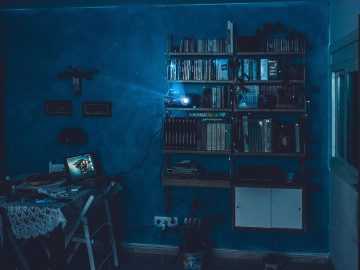After numerous stops and starts, a key legislative committee voted Monday to regulate the controversial “deep fake” images that are created by artificial intelligence.
As the bill has been crafted over the past two years with the help of a task force, one of the highest-profile issues has been to make it a crime to spread pornographic material that was generated by artificial intelligence.
After a relatively brief debate, the Democratic-controlled judiciary committee voted unanimously for the measure that still requires approval by the full Senate and House of Representatives.
Known as “deep fakes,” the images are generated by AI through videos and other means that can take a person’s image and distort it in a negative way. False images were spread on the internet of famed singer Taylor Swift, which gained widespread attention. The same methods, however, can be used against average citizens and spread publicly as “revenge porn.”
The deep fake issue was broken off into a separate bill because lawmakers could not agree on all the aspects of a much larger, all-encompassing bill that would regulate the fast-developing world of artificial intelligence.
Lawmakers are still struggling in a delicate balancing act to try to foster regulation at the same time as some officials are concerned about restricting the growth of artificial intelligence that can be used in a wide variety of fields, including health care.
State Rep. Doug Dubitsky, a Republican attorney, said the bill only affects images of a real person and not fictional characters. The bill’s language states that it covers “a photograph, film, videotape or image of a person.”
Rep. Craig Fishbein, the committee’s ranking House Republican, said the measure’s purpose is to “reduce the amount of ridicule” that some have faced, including teenagers who have committed suicide.
The measure was placed on the consent calendar for non-controversial items that have unanimous support.
Opposition
Despite the unanimous support of the committee members, some attorneys and First Amendment advocates testified that the underlying bill was far too vague and subject to wide interpretations.
“The ultimate result of this bill is the potential for criminalizing conduct that is not a crime, as well as creating a variety of First Amendment challenges, vagueness challenges, and uneven application of the law in terms of who gets prosecuted and for what – especially children/juveniles, college students, and young adults,” John R. DelBarba, assistant legal counsel for the chief public defender’s office, said in written testimony. “It is clear that these laws are creating a fundamentally new category of criminal behavior. The real concern here is that this office believes that this legislation will have unintended consequences.”
He added, “Given our current technology used by children/juveniles, high school and college students such as Apple AirDrop, Instagram, Snapchat, and similar technologies and/or apps, which have the ability to transfer an unlimited number of images to an unlimited number of people with the press of a button on your phone, this statute can turn an entire high school into felons within one school day. All with a single image or two as these images are passed around and around — disseminated across the school at the high rate of speed of the Internet.”
But the House Republican caucus, which pushed for the measure, said that it is necessary.
“It is not difficult to acknowledge that our current law falls far short of where it should be,” the caucus said in a statement. “There are numerous stories of public figures victimized through digital pornographic images and videos created with artificial intelligence. Further, instances of a scorned lover using artificial intelligence to create “revenge porn” are similarly and disturbingly common. The reality is that each of us is a potential victim — children, young professionals, marginalized individuals, public figures, neighbors, and families.”
While artificial intelligence has positive aspects, the caucus said “in the context of the dissemination of digitally altered intimate images, its use is much more sinister and disturbing.”
Both Democrats and Republicans held lengthy caucuses on the bills Monday because they are in the final week before a key deadline on Friday as the committee is scrambling to get its work done.

Yehyun Kim/CT Mirror
The top four leaders of the judiciary committee, left to right, are state Rep. Craig Fishbein of Wallingford; Sen. John Kissel of Enfield; co-chairman Steven Stafstrom of Bridgeport and co-chairman Sen. Gary Winfield of New Haven. They are show here in 2023 in Hartford. (Yehyun Kim/CT Mirror)
Guns
Lawmakers passed a bill that would allow civil lawsuits to be filed by victims of gun violence against “irresponsible firearm industry members,” said Rep. Steven Stafstrom of Bridgeport, the committee’s co-chairman.
Fishbein thanked Stafstrom for working together on the language of the measure as lawyers from opposing political parties.
“It’s important that those who sell products nationwide understand that Connecticut is very different from the rest of the country,” Dubitsky said, noting that bear hunting and “constitutional carry” that allow firearm possession without a permit are allowed in multiple states but not Connecticut.
“I think it is directed at stifling the constitutional rights of the people of this state, and I cannot support it,” Dubitsky said.
A second gun bill focused on laws that disqualify residents from obtaining a carry permit.
“Generally speaking, if you’re convicted of a felony, that is an automatic disqualifier” to obtain a gun, Stafstrom said. “Unfortunately, there’s a loophole in our law. … In essence, we are treating our own residents more harshly” than others who have been convicted of misdemeanor disqualifiers in other states.
The Democrats defeated a separate bill on guns, House Bill 7070, that would have treated churches similar to a home regarding a duty to retreat.
“An individual in their home does not have a duty to retreat,” Fishbein said. “Approximately three years ago, we had issues around the country and in other countries as well, people were targeting houses of worship and people inside were not allowed to defend themselves.”
But top Democrat voted against the bill as Stafstrom said, “I worry where it ends.”
“Does that extend to the movie theater, the grocery store, the Little League field?” Stafstrom asked. “I’m worried about where this goes.”
Smoking pot while driving
The issue of smoking marijuana while driving has been controversial for years, and the committee hatched a bipartisan compromise Monday by combining two bills together, House bills 7132 and 7258.
“It prevents an officer from pulling over a driver who has dangling dice in the windshield,” Stafstrom said, adding that it “expressly empowers law enforcement to pull over” a driver for smoking marijuana.
“We tried to merge those two concepts together’.’
Kissel voted against the bill, saying, “If it was a standalone on the cannabis issue, I would not be hesitant to support the bill. … You hear tales of people flaunting that they’re smoking a joint while driving.”
The Connecticut Police Chiefs Association lobbied for years against the legalization of recreational marijuana because police said officers lacked a roadside test to prove that a driver has been smoking marijuana. By contrast, police are able to administer a simple blood alcohol test to know precisely how much alcohol a person has consumed when pulled over for drunken driving.
Rep. Thomas O’Dea, a New Canaan Republican who voted for the compromise bill, has cited a provision that was passed as part of the recreational marijuana law in 2021 that says that “the odor of cannabis or burnt cannabis” cannot be used as the sole reason for probable cause for an officer to pull over a driver.
“I’ve been very vocal in my frustration,” O’Dea said Monday. “I found out a new term that I never knew — showing my age — termed the hot box. I said, what the heck’s a hot box? It’s people are smoking marijuana in a confined space and everyone gets high. … When in history has a driver gotten impaired by a passenger drinking a beer or an alcoholic beverage?”
State Rep. Greg Howard, a Republican who also works as a police detective in Stonington, seconded the bill, saying he favors the compromise measure because it makes progress on the issue.
“It alleviates a significant public safety concern,” Howard said, “and for that, I am grateful.”
 State Rep. Tom O’Dea, a New Canaan Republican, has been outspoken on the issue of smoking marijuana while driving. Here, he speaks on the House floor at the Capitol in Hartford in Feb. 2024. (Aaron Flaum/Hartford Courant)
State Rep. Tom O’Dea, a New Canaan Republican, has been outspoken on the issue of smoking marijuana while driving. Here, he speaks on the House floor at the Capitol in Hartford in Feb. 2024. (Aaron Flaum/Hartford Courant)
Christopher Keating can be reached at ckeating@courant.com






